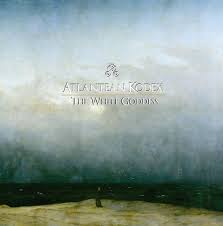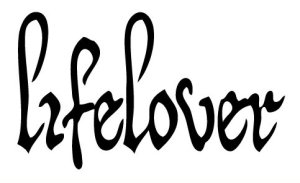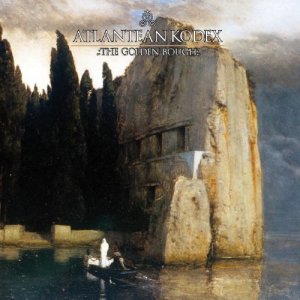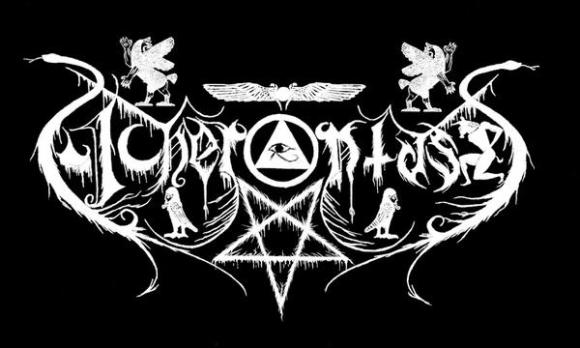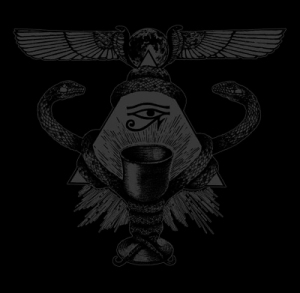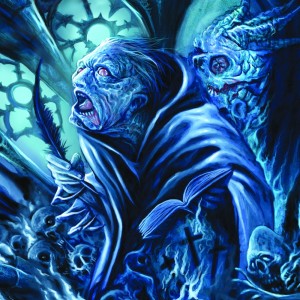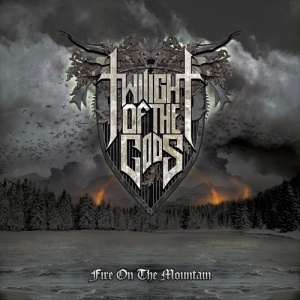
The Finnish summer has started fading away, so it’s time for the Finnish autumn – and Finnish music. It’s quite unbelievable how all these albums are coming out almost same time, and same time there are also a few other Finnish albums twisting my mind like Jumalhämärä‘s Resitaali, Ranger‘s Knights of Darkness or Pyhä Kuolema‘s Kevättuulisormi. And all these artists walk more or less their own road, so that just shows even clearer how fine is my home country’s situation nowadays. Of course some of these releases get a bit subjective bonuses from my direction but I’m sure that if even you’re not familiar with these bands or their music, you would like them too – at least some of them. So autumn, come forth and show your beautiful decadence – I have enough songs for it.
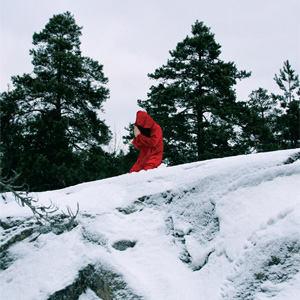
COSMIC CHURCH: Ylistys (Kuunpalvelus 2013)
Finally it’s here, officially. This album has walked a long road, and when you wander through the every minute of its 75 minute length, you understand that this is a monumental album, a true church of Isaac. However, it’s interesting to notice how fluent and natural is the stream of music on Ylistys. This album truly flows, with long songs, wailing and cinematic guitar leads and repetitive tempos. There are changes – from peaceful moments to blastbeats, as in Kätketyn Tulen Vartija – but the main core of this album lies in melancholy and devotion.
I would even say that Ylistys is a combination of modern Finnish black metal, epic touches of Austere and wideness of Godspeed You! Black Emperor. Luxixul Sumering Auter, the sole priest of Cosmic Church, paints touching landscapes with his guitar that aren’t so far from the shivering nature of post-rock. But still, the anger is there, as is sorrow – listen to those anguished shrieks of L.S.A. if you don’t believe me. And while talking about the vocals, L.S.A. has a supportive liturgist, Atvar of Circle Of Ouroborus (okay, now I lost my objectivity…), whose performance in the end of Täydellisen Valon Äärellä is simply astonishing.
75 minutes is quite much, and it becomes clear that Ylistys tends to be a bit dull now and then. Also all the changes from a part to another inside these long songs don’t happen without collisions every time. This makes me wonder how Cosmic Church would nail a short and striking 4-minute song with this recent style… Let’s see if we can witness this in the future. But in general, Ylistys lives by its name: this is one wide praise to gods out there and gods inside of us. Massive and intimate at the same time.
I asked mr L.S.A. if he wanted to tell something about one particular song, but as expected, it was hard to cut up one tile from this church:
– Personally I see the whole album as a description of a spiritual journey; the first song being the creation of the “Foundation” to which everything can grow & develop and the last song being the end of the path, “The Absolute Light”. I believe the key to this album lies as much in these beginnings and endings as during the journey, which is as important as the destination. Lyrically these two songs are the ones which speak to me the most, but I see Ylistys as a whole; it is Apotheosis, Eulogy, Adoration, Praise, Veneration and yet these are just plain words for something far greater beyond any words, and the album has been created from my own limited perspective trying to adore and praise these great, magnificent and eternal cosmic forces.
Two songs off from Ylistys: https://soundcloud.com/kuunpalvelus
W.A.I.L.: II (Ahdistuksen Aihio 2013)
W.A.I.L.’s second full-length is also monumental, and well-thought. This Finnish band’s death/doom metal has very traditional roots, but all the interesting ideas and arrangements make this album a piece of art which needs lots of listening and concentration. And by this I don’t mean that the music itself would be somehow difficult or too artistic: actually it’s quite easy to dive into these crushing riffs, majestic guitar leads and mellower moments, but same time you have to understand how much vision and work all this must have demanded – especially in the lyrics.
So what you get is grotesque and robust metal songs that create strong images like the best modern “dark death metal” bands do nowadays. But this album isn’t only about heaviness: W.A.I.L. also operates in the field of silence creating piano songs and even jazzy and hazy jamming. Also the instrument arsenal is impressing, from that before-mentioned grand piano to violins and even didgeridoos. But everything is here to serve the cause – the band’s attempt to show how both negative and positive sides are just one grand form of existence.
The songs are strong, the band plays with talent and with heart, and in general the album has an eerie atmosphere. But sometimes I wonder if less would have been more. These experimental interludes (well, they can be considered real songs) are good as themselves, but for example this jazzy song called Abyss breaks the picture a bit too much in my opinion. But this is just my critical mind talking here. W.A.I.L. has improved from their debut and although they salute the gods of death/doom/black metal now and then, they also stand on the ground of their own.
Let’s continue the theme in these questions and give the floor to A.E. to explain the story behind Abyss:
– The Abyss passage was inspired by the sea and more broadly, by the element of water. I and S.F. wrote the music for it and we both have grown up in a small wooden town called Kristiinankaupunki which stands by the Gulf of Bothnia so as long as I can remember the sea has been a part of my life in many ways. I still remember this certain vibrant, mysterious and also somewhat ominous feeling it evoked in me as a child, especially when I was watching the waves float by at the evening, and this was the feeling I originally wanted to capture when I wrote the riff for Abyss. Only afterwards when I started to create the concept for this full-length came the historical background story and the ideological blabbering. Don’t get me wrong though, the conceptual idea in which this final passage of the whole first song is supposed to represent the state of total hopelessness i.e. “floating on the waves of madness”, is also surely important but it’s not really something I think about a lot when listening to this piece as it is at its core even more personal for me.

MÖRKÖ: Itsensänimeävä (Vaticanian Roadkill / Ahdistuksen Aihio 2013)
And the weirdest bunch comes the last. Mörkö has been sometimes doomy black sludge, sometimes minimalistic black metal, but now they take a more sophomore road. Itsensänimeävä (‘Self-titled’ – a great title, eh?) is still dark, obscure and deranged but stylistically this album is very close to Norway’s Virus: jazzy and tangling riffs that drive this experimental black metal truck forward, multileveled vocals which can be hazy poem reading in one point or insane shouting in another, top-notch musicianship that really takes risks etc. There are even a few free jazz moments if I interpret those chaotic blastings right.
This all may sound quite unfocused but Itsensänimeävä is still a very dynamic piece of work. The drums and the riffs go well together, and also the bass guitar is in a big role which isn’t quite rare in black metal. The songs take twists and turns but the movement is always forward, or at least something important is happening all the time. The slowest and most peaceful moment is in the middle of all this, when Kosmoksen huhmareessa (a 13 minute long behemoth) eases down to an improvised (?) guitar picking in the end. A very natural and very effective solution.
As in both cases before, it’s quite hard to say concretely what is wrong in Itsensänimeävä, but I think it’s something about the general character of this music: this is artistic music, made by artists with a strong vision, so it’s not always easy for listener to get into this a bit introverted world of Mörkö. But it’s not a big deal. Stand aside and just listen to this album and feel how brilliantly Mörkö is fucking with your head.
I asked Jari-Matti Nurminen about the ending of Kosmoksen huhmareessa and the role of improvisation in Mörkö and got the answers – and much more.
– The role of improvisation in making of Itsensänimeävä was quite small, perhaps even more so than in ‘normally functioning’ bands (meaning jamming out ideas at the rehearsal and then developing those into songs).
The whole thing began in the spring of 2009, when I got some ideas for new material. IV pretty much wiped the slate clean and for a year there was no idea where to go next. So, then an idea came to have songs and riffs and vocals and all that avantgarde stuff, you know. Then I started to make some riffs, but at the same time a growing interest toward systematic composition was forming in my being.
This lead to new perspectives on how to make songs out of few riffs. For example set theory I found very interesting, combined with basic variation principles. This is basically quite simple and can lead to interesting findings:
First you have a Riff. It’s important to have some substance from which you generate the material so you don’t end up with an empty form, that just resembles music. This is always a danger in composition.
You take the Riff into its pieces; basically you look at what’s there, which notes are used and what kind of rhythmic shapes? There you have material. You can turn the riff backwards, or inside out or reverse the intervallic movements, but this is classical stuff. You can also just keep the rhythmic vibe and use the same notes, remove some, add some, transpose the basic material to create tension and so forth… Maybe even have an idea how these will develop during the piece, for example beginning with two notes and ending up with ten, that’s rock’n’roll entropy there!
You don’t have to use variations as they come but to just find new ideas and make the ideas into new Riffs. It might be helpful to put this on paper. Standard notation is very practical since guitar (and keyboard) is an equally tempered instrument so you don’t get much out of using a weird system of your own. Probably no one will have any idea what’s been written (including yourself, after a few months, been there). So, this ”old world” -technique makes it possible to share your ideas with your bandmates. At some level, this is about communication, isn’t it? Might sound a bit gay for all the record releasing misanthropes, but let’s face it.
You can also skip the fancy pancy notation stuff and just check the notes and make a new Riff from the notes, relying on your music instinct. It might be even better. This you should do even if you end up writing it down. Without pen and paper you have to memorize it, and that takes a lot of resources at some point.
The point in all this is to maintain coherence throughout the song – or even an entire album – by this quite simple technique. It allows you to make very different things, still maintaining ”the feel” of that same music. I like to think of it as a ”chaos bathysphere”; the better the construct, the deeper it will take you and if things go well you’ll come back with a broader consciousness and more stable groundings of your being. And that can give you strength that’s real, but it’s a long process and takes a lot of ups and downs. And you don’t need drugs for that, unless you want to ”enhance” things a bit as some of us do. Music is a true path to understanding reality more deeply, but you have to take it seriously and really devote yourself to it. That’s what black metal is for me. It’s ”just” a style of music, but that doesn’t make it any shallower. To me some random pub rock with some naughty words in the lyrics is false black metal, whatever to poorness of production values might be. Where’s the striving? Jump in the fire and burn, I say! Look the thing in the eye.
Now, this can lead to interesting results, but a compositional technique is not a ”song automaton”. You still have to decide how you variate your material, now you just have a clearer area in which to work, so that allows the resources to be directed into other aspects of the music. This helps to take things deeper.
So, in the early summer of 2009 I had the first (Ruumis loi itsensä omaksi kuvakseen) and the last song (Nesteen luo) written down and we went to our rehearsal place with Heikki (Kivelä, bass). It was easy to share the ideas also on paper, since Heikki has very professional skills in these things. The basic structures and order of the parts were pretty much already organized. The amount of repetition was found together by playing the songs a lot during the next few years. Heikki’s precise arrangement work with the percussion had a big effect in the dynamic formation of the songs. And that really makes the difference. The two songs in the middle were composed about a year later and the additional guitars and bass were arranged bit by bit with the vocals during 2010-2012.
The material in the ending of Kosmoksen huhmareessa is composed but its final execution is improvisation-like. The different parts were ready, but the amount of repetition or the dynamic relations were found ‘improvisationally’ in the moment of recording. This take was chosen to be kept on the album due to its spontaneous nature.
Thus the answer to your question is ”yes and no”.
The whole album, it’s here: http://morkomusic.bandcamp.com/album/itsens-nime-v







